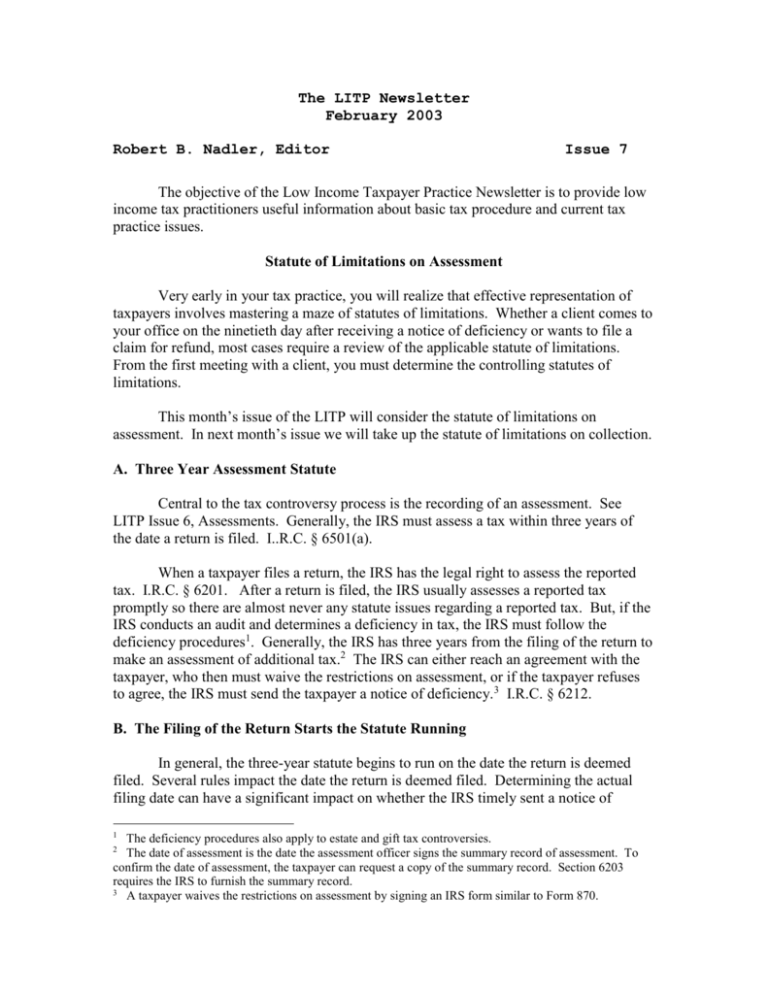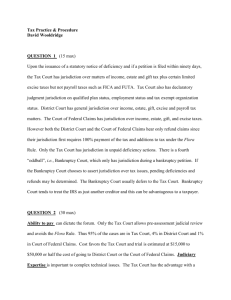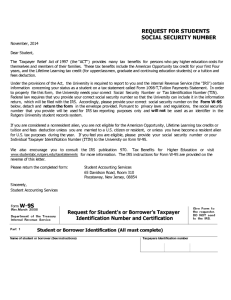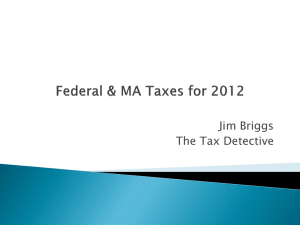
The LITP Newsletter
February 2003
Robert B. Nadler, Editor
Issue 7
The objective of the Low Income Taxpayer Practice Newsletter is to provide low
income tax practitioners useful information about basic tax procedure and current tax
practice issues.
Statute of Limitations on Assessment
Very early in your tax practice, you will realize that effective representation of
taxpayers involves mastering a maze of statutes of limitations. Whether a client comes to
your office on the ninetieth day after receiving a notice of deficiency or wants to file a
claim for refund, most cases require a review of the applicable statute of limitations.
From the first meeting with a client, you must determine the controlling statutes of
limitations.
This month’s issue of the LITP will consider the statute of limitations on
assessment. In next month’s issue we will take up the statute of limitations on collection.
A. Three Year Assessment Statute
Central to the tax controversy process is the recording of an assessment. See
LITP Issue 6, Assessments. Generally, the IRS must assess a tax within three years of
the date a return is filed. I..R.C. § 6501(a).
When a taxpayer files a return, the IRS has the legal right to assess the reported
tax. I.R.C. § 6201. After a return is filed, the IRS usually assesses a reported tax
promptly so there are almost never any statute issues regarding a reported tax. But, if the
IRS conducts an audit and determines a deficiency in tax, the IRS must follow the
deficiency procedures1. Generally, the IRS has three years from the filing of the return to
make an assessment of additional tax.2 The IRS can either reach an agreement with the
taxpayer, who then must waive the restrictions on assessment, or if the taxpayer refuses
to agree, the IRS must send the taxpayer a notice of deficiency.3 I.R.C. § 6212.
B. The Filing of the Return Starts the Statute Running
In general, the three-year statute begins to run on the date the return is deemed
filed. Several rules impact the date the return is deemed filed. Determining the actual
filing date can have a significant impact on whether the IRS timely sent a notice of
1
The deficiency procedures also apply to estate and gift tax controversies.
The date of assessment is the date the assessment officer signs the summary record of assessment. To
confirm the date of assessment, the taxpayer can request a copy of the summary record. Section 6203
requires the IRS to furnish the summary record.
3
A taxpayer waives the restrictions on assessment by signing an IRS form similar to Form 870.
2
deficiency, whether a statute extension is valid or whether the taxpayer’s claim for refund
is timely. Whether the three-year assessment statute has expired has launched many
court cases.
Rules that apply to the filing of a return.
1. General Rule. A return is deemed filed upon receipt by the IRS. Note this rule
is often eclipsed by the other rules.
2. Due Date for Individual Return. The due date for an individual return is the
fifteenth day of the fourth month after the end of the taxable year. I.R.C. § 6072(a). For
most taxpayers this is April 15th. Almost all returns filed on or before April 15th are
deemed filed on April 15th due to the rules below.
3. Early Return. A return filed before the last date prescribed by law for filing
the return will be deemed filed on the last date. I.R.C. § 6501(b)(1). For example an
income tax return for 2002 filed on March 1, 2003, is deemed filed on April 15, 2003.
4. Timely Mailed is Timely Filed. A return properly posted before the due date
and received after the due date is deemed filed on the date mailed. I.R.C. § 7502. For
example, a return mailed to the IRS on April 14, 2002 and received by the IRS on April
17, 2002 is timely filed. (The return is deemed filed on April 15, 2002. See Early Return
above.)
5. Saturday, Sunday or Legal Holiday. If the statutory due date falls on a
weekend day or a holiday, the last date for filing is the next business day. I.R.C. § 7503.
For example, if the filing date falls on Saturday April 15th, a return mailed on Monday
April 17th is timely and is deemed filed on April 17th.
6. Extension. If the return is filed pursuant to a valid extension, the above rules
apply to the extension date. But, the rules can create different results because there is not
a rule similar to the Early Return Rule under section 6501 (b)(1). Consider a taxpayer
who has received an extension to August 15th and mails the return on August 12th. If the
return is received on August 14th, the date of receipt is the filing date. But, if the return is
received on August 16th, section 7502 is involved and the filing date is the date
postmarked or August 12th.
C. Exceptions to the Three Year Assessment Statute
The exceptions to the three-year assessment statute generally involve providing
the IRS additional time to make the assessment or to follow the deficiency procedures. In
most cases, the additional time is due to a taxpayer’s choices or conduct.
2
1. False or Fraudulent Return. An assessment relating to a false or fraudulent
return is not subject to any statute of limitations. I.R.C. § 6501(c)(1). 4
2. No Return Filed. Where the taxpayer fails to file a return, an assessment is not
subject to the normal three-year rule. I.R.C. § 6501(c)(3)5
3. Substantial Omission. If the taxpayer omits at least 25 percent of gross income
from his or her return, the statute of limitations is enlarged to six years. I.R.C. § 6501(e).
Suspension of Assessment Statute
Under certain circumstances, usually when the IRS is prohibited from taking
collection action, the statute of limitations on assessment is suspended.
1. Deficiency Procedures. As part of the deficiency procedures, the IRS is
prohibited from making an assessment for ninety days after the mailing of a notice of
deficiency. During this period, the statute of limitations on assessment is suspended.
I.R.C. § 6503(a)(1)
If a taxpayer petitions the Tax Court, the statute of limitations on assessment is
suspended until the decision of the Tax Court becomes final and for sixty days thereafter.
I.R.C. § 6503(a)(1).
2. Third Party Summons. If the taxpayer intervenes in a proceeding to enforce a
summons. I.R.C. § § 7609(b), 7609(e)(1).
3. Designated Summons To A Corporate Taxpayer. I.R.C. § 6501(k).
4. Receivership. I.R.C. § 6872
Bankruptcy - Assessment Statute Not Suspended
Originally, upon the filing of a petition in bankruptcy, the automatic stay
prohibited the assessment of the tax and the commencement or continuation of a Tax
Court proceeding. 11 U.S.C. § 362(a)(8). In 1994 Congress excluded “the making of an
assessment” from the acts prohibited by the automatic stay. 11 U.S.C. § 362(b)(9)(D). If
a petition has been filed, the Tax Court must be notified and the proceeding is stayed.
4
See Badarraco v. Commissioner, 464 U.S. 386, in which the Supreme Court held that the filing of a
correct return after filing a false return did not begin a new statute of limitations.
5
But, see Baral v. Commissioner, 528 U.S. 431 (2000), in which the Supreme Court held that a taxpayer
could not recover a refund of withheld taxes when he filed his return several years late. Withheld taxes are
deemed paid as of the 15th day of the fourth month following the taxable year. I.R.C. § 6513(b)(1))
3
But, the assessment statute is not stayed by bankruptcy.6 If the three-year assessment
period expires while the taxpayer is in bankruptcy, additional assessments are barred.
A taxpayer must exercise care if a notice of deficiency is issued. Because the
debtor is prohibited from filing a petition by the automatic stay, some parallel statute had
to be enacted or the IRS would assess the tax after 90 days. Section 6213(f)(1) provides
that the period for filing a petition in the Tax Court is suspended during the period that
the debtor is prohibited from filing a petition and for an additional 60 days. Thus, the
debtor is provided an indefinite period to file a petition with expiration dependent upon
the expiration of the automatic stay. Finally, in appropriate situations, such as the filing
of a decision document, the debtor and the IRS can file a joint motion to lift the automatic
stay.
Extension of Statute – Written Notice Of Taxpayer’s Right to Refuse
Prior to the expiration of the period of assessment, the taxpayer and the IRS may
agree in writing to extend the statute of limitations. I.R.C. § 6501(c)(4). Generally, the
statute can be extended by the parties signing a Form 872, Consent to Extend the Statute
of Limitations. A valid consent for a joint return must be signed by both taxpayers or by
their representative.
After December 31, 1999, the IRS is required to inform the taxpayer of his or her
right to refuse to extend the statute of limitations. I.R.C. § 6501(c)(4)(B). The Internal
Revenue Manual requires the IRS to give the taxpayer written notice of the right to refuse
to extend the statute. I.R.M. 121.2.22.3.
Practice Idea. Restricted Consents. In signing an agreement to extend the statute,
Form 872 or Form 872-A, the representative can request a restricted consent. A restricted
consent narrows the issues that the IRS may raise after the statute expires. For example,
if the IRS has raised issues involving whether the taxpayer is entitled to the earned
income credit and the IRS requests that the taxpayer extend the statute of limitations for
one year, the representative may propose language be used which narrows the
investigation to the earned income credit issue. Later, if the IRS raises issues in the
notice of deficiency which are outside the issues set out in the restricted consent, for
example issues involving the disallowance of exemptions, a motion to limit the
issues to the issues set out in the restricted consent can be filed.
Breaking News. IRS Provides Guidance On Innocent Spouse Relief for
Nonrequesting Spouse. On January 31, 2003, the IRS issued a new revenue procedure
providing new rights for a former spouse who opposes the IRS granting innocent spouse
relief to a requesting spouse. Prior to the revenue procedure, the nonrequesting spouse
did not have the right either to file a written protest or to have an administrative
conference. Now, the nonrequesting spouse has been granted these rights. Importantly,
the nonrequesting spouse may not file a petition with the Tax Court if the IRS reaches a
final determination to grant innocent spouse relief to the requesting spouse. The new
6
See Chapter 7 Debtor Should Sign Form 872 to Extend Limitations Period. 2002 TNT 47-28.
4
procedure is effective for claims filed after April 1, 2003. See Rev. Proc. 2003-19; 2003
TNT 22-8
The Low Income Tax Practice Newsletter is produced by Legal Aid Society of Middle Tennessee and
the Cumberlands and the Tennessee Taxpayer Project, Mary Gillum, Project Coordinator and
Robert B. Nadler, Attorney. The Tennessee Taxpayer Project is funded in part by the IRS LITC
Grant Program. We are interested in any subjects that Legal Aid lawyers would like discussed.
Please direct questions or comments to mgillum@lglaid.org or rnadler@lglaid.org . © 2003, Robert
B. Nadler, Low Income Tax Practice Newsletter, all rights reserved.
The information contained in this newsletter is for general guidance only and is not legal advice
provided to a client. The Legal Aid Society and contributors disclaim all responsibility (including
negligence) for all consequences of any person who acts in reliance on the information contained
herein.
5






